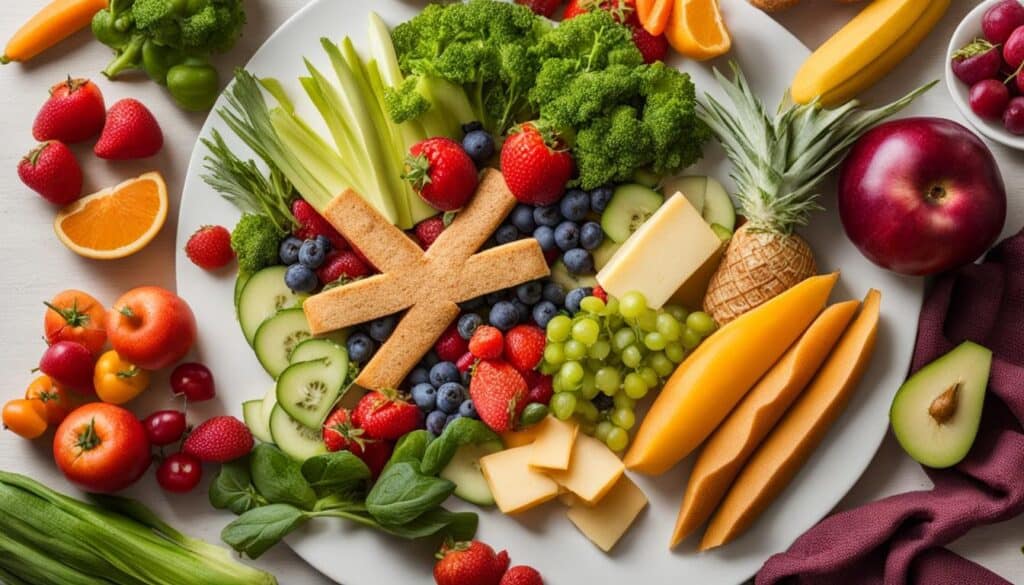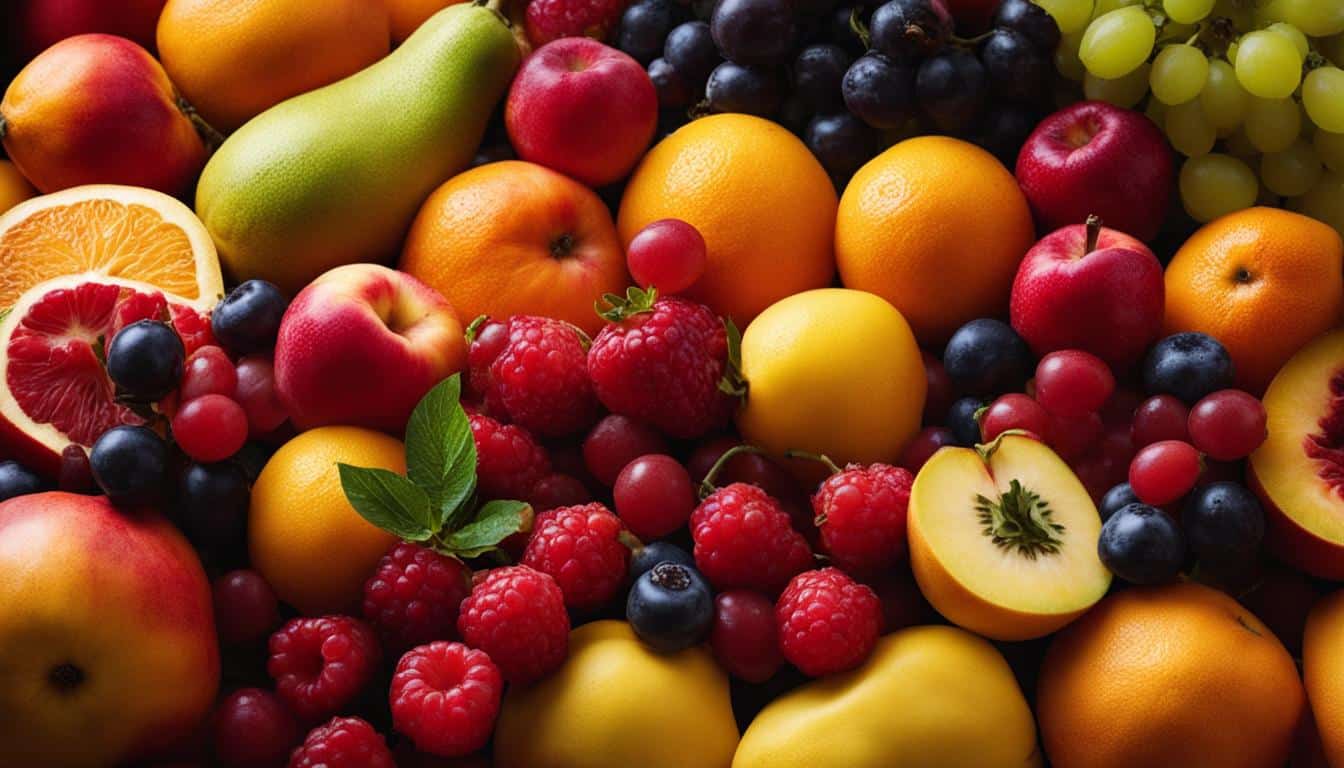Welcome to our informative article on the potential link between fruit consumption and diarrhea. Many of us enjoy the sweet, juicy goodness of fruits, but can they sometimes lead to digestive upset? In this article, we will delve into this question and provide insights into how certain fruits can affect bowel movements and contribute to diarrhea.
It’s important to note that while fruits are generally beneficial for our health, some individuals may experience digestive issues after consuming certain fruits. Understanding these potential triggers can help you make informed choices about the fruits you include in your diet.
Key Takeaways:
- Fruit consumption can contribute to diarrhea in some individuals
- Specific fruits may cause digestive upset and bowel irregularities
- Factors such as sugar content, caffeine, high-fat content, and FODMAPs can play a role in fruit-induced diarrhea
- Keeping a food and symptom diary can help identify problematic fruits
- Consulting a healthcare professional is important for persistent diarrhea or severe symptoms
Foods that Cause Diarrhea: Sugar and Artificial Sweeteners
When it comes to the potential causes of diarrhea, sugar and artificial sweeteners can play a significant role. One component of table sugar, known as fructose, can lead to digestive issues and diarrhea in some individuals. Approximately 30-40% of people may have trouble digesting significant amounts of fructose, which is naturally occurring in fruits and also found in high quantities in certain sweeteners.
To avoid potential digestive upset, it is important to be mindful of fruits that are high in fructose, such as apples, grapes, agave, and honey. Additionally, sugar alcohols like sorbitol, mannitol, xylitol, and erythritol, which are commonly used in artificial sweeteners, can also cause diarrhea if consumed in large quantities.
To better understand the potential impact of sugar and artificial sweeteners on digestive health, let’s take a look at a table comparing the fructose content in different fruits:
| Fruit | Fructose Content |
|---|---|
| Apples | Approximately 7 grams per medium-sized apple |
| Grapes | Approximately 10 grams per cup |
| Agave | Approximately 15 grams per tablespoon |
| Honey | Approximately 17 grams per tablespoon |
In addition to monitoring fruit consumption, it is important to read food labels and be aware of the presence of sugar alcohols in sweeteners. By being mindful of these factors and moderating intake, individuals can help reduce the risk of experiencing diarrhea related to sugar and artificial sweeteners.
Foods that Cause Diarrhea: Caffeine
Drinks and foods that contain caffeine can have a stimulant effect on the digestive system, potentially leading to diarrhea in some individuals. Caffeine is found in popular beverages such as coffee, tea, soda, and even chocolate. It acts as a natural laxative by accelerating the movement of food through the intestines, which can result in loose stools and increased bowel movements.
For those already prone to digestive issues, the effects of caffeine on digestion can be more pronounced. Individuals with conditions such as irritable bowel syndrome (IBS) or inflammatory bowel disease (IBD) may experience heightened sensitivity to caffeine’s stimulant properties, leading to diarrhea and discomfort.
To manage the potential diarrhea-inducing effects of caffeine, individuals can consider reducing their consumption of drinks and foods high in caffeine. It may also be helpful to incorporate soothing, low-caffeine alternatives into the diet, such as herbal teas or decaffeinated beverages. Additionally, monitoring and balancing caffeine intake with adequate hydration and a well-rounded diet can contribute to overall digestive health.
Foods that Cause Diarrhea: Caffeine
| Foods and Drinks with Caffeine | Caffeine Content (mg) |
|---|---|
| Coffee (8 oz) | 95-165 |
| Black Tea (8 oz) | 25-48 |
| Soda (12 oz) | 30-60 |
| Chocolate (1 oz) | 5-35 |
- Avoid excessive consumption of coffee, especially strong brews, to minimize the risk of caffeine-induced diarrhea.
- Opt for herbal teas or decaffeinated alternatives for a soothing hot beverage without the potential digestive side effects.
- Be mindful of caffeine content in energy drinks and sodas, as they can contain significant amounts of caffeine.
- Consider discussing caffeine consumption with a healthcare professional if you have a pre-existing digestive condition.
“Caffeine acts as a natural laxative, which can accelerate food movement and lead to diarrhea in susceptible individuals.” – (Dr. Amanda Johnson, Gastroenterologist)
Foods that Cause Diarrhea: High Fat Foods
Foods that are high in fat can be difficult to digest and may lead to digestive dysfunction and diarrhea. When we consume high-fat foods, our bodies have trouble breaking them down and processing them efficiently. This can result in digestive difficulties and discomfort, such as bloating, cramping, and loose stools.
One reason high-fat foods can cause diarrhea is their impact on the production of bile. Bile is a substance produced by the liver and stored in the gallbladder, which helps break down fats. When we consume high quantities of fat, it triggers the release of more bile into the digestive system. This increased production of bile can speed up the movement of stool through the intestines, leading to diarrhea.
Additionally, high-fat foods can also increase the water levels in the bowel. Fats slow down the absorption of water in the intestines, leaving more water present in the stool. This excess water can contribute to loose stools and diarrhea.
Effects of High Fat Foods on Digestion
Consuming a diet high in fat on a regular basis can have long-term effects on digestion. Over time, the digestive system can become less efficient at breaking down and absorbing fats. This can lead to ongoing digestion difficulties and a higher risk of experiencing diarrhea after consuming high-fat meals.
| Foods High in Fat | Examples |
|---|---|
| Fast food | Burgers, fries, pizza |
| Fried foods | Chicken nuggets, fried chicken, onion rings |
| Processed meats | Sausages, bacon, hot dogs |
High-fat foods can be a trigger for diarrhea, so it’s important to be mindful of your fat intake if you’re prone to digestive issues. Opting for leaner sources of protein, such as chicken or fish, and incorporating more fruits, vegetables, and whole grains into your diet can help support healthy digestion.
If you experience frequent diarrhea or digestion difficulties after consuming high-fat foods, it may be helpful to consult with a healthcare professional or a registered dietitian. They can provide personalized guidance and recommendations to help manage your symptoms and optimize your digestive health.

Foods that Cause Diarrhea: Spicy Foods
Spicy foods, known for their fiery flavors and intense heat, can sometimes be a culprit behind digestive upset and diarrhea. The active component in spicy foods, capsaicin, can irritate the lining of the stomach and intestines, leading to gastrointestinal discomfort. While many individuals can tolerate spicy foods without any issues, some people may experience diarrhea after consuming them.
Chili peppers, in particular, are a common source of capsaicin and can be found in various cuisines around the world. The level of capsaicin in different peppers varies, with some being milder and others packing a much spicier punch. It’s important to note that each person’s tolerance to spicy foods differs, and what may cause diarrhea in one individual may not affect another.
If you experience digestive upset or diarrhea after consuming spicy foods, it may be helpful to reduce your intake or avoid them altogether. This can help alleviate symptoms and improve your overall digestive health. It’s also a good idea to pay attention to the specific spices and ingredients used in dishes, as certain combinations or cooking methods can intensify the heat and increase the likelihood of experiencing digestive issues.
How to Enjoy Spicy Foods Without Digestive Upset
Here are a few tips to enjoy spicy foods without experiencing diarrhea or digestive discomfort:
- Start with milder spices and gradually increase the heat level to gauge your tolerance.
- Pair spicy foods with easily digestible ingredients like rice or yogurt to help mitigate any potential digestive issues.
- Opt for fresh spices and avoid pre-packaged spice mixes that may contain additional additives or preservatives.
- Drink plenty of water or consume foods with a cooling effect, such as cucumber or mint, to help counteract the heat.
By being mindful of your personal tolerance to spicy foods and making adjustments as needed, you can still enjoy the flavors and excitement they bring without the discomfort of diarrhea.
Foods that Cause Diarrhea: Lactose
Lactose, a natural sugar found in dairy products, can cause diarrhea in individuals who have lactose intolerance or lactose malabsorption. Lactose intolerance occurs when the body doesn’t produce enough lactase, the enzyme responsible for breaking down lactose. As a result, undigested lactose can pass into the colon, where it can draw water into the intestines and cause loose stools. Symptoms of lactose intolerance may also include bloating, gas, and abdominal pain.
Individuals with lactose intolerance may find relief by consuming aged dairy products, which have reduced lactose content due to the fermentation process. Examples of aged dairy products include hard cheeses like cheddar, Swiss, or Parmesan. Additionally, lactose-free dairy products, such as lactose-free milk or lactose-free yogurt, are available and can be consumed without triggering symptoms of diarrhea. It’s essential to read labels carefully, as some dairy products may still contain lactose.
Following a lactose-free or low-lactose diet can help manage symptoms of diarrhea in individuals with lactose intolerance. It’s also beneficial to keep a food diary, tracking symptoms after consuming dairy products. This can help identify specific triggers and allow for more informed dietary choices. Consulting with a healthcare professional or registered dietitian can provide further guidance and support in managing lactose intolerance and its associated diarrhea.
| Foods to Avoid | Foods to Include |
|---|---|
| Milk | Lactose-free milk |
| Ice cream | Lactose-free ice cream |
| Yogurt | Lactose-free yogurt |
| Soft cheeses (e.g., cottage cheese) | Hard cheeses (e.g., cheddar, Swiss, Parmesan) |
| Butter | Margarine or lactose-free butter alternatives |
| Cream-based sauces and soups | Broth-based sauces and soups |
| Certain baked goods (e.g., muffins, cakes, cookies) | Baked goods made with lactose-free milk or alternative non-dairy milks |
It’s important to note that lactose intolerance is different from a milk allergy. A milk allergy is an immune response to the proteins in milk rather than the lactose sugar. If you suspect a milk allergy, it’s crucial to consult with a healthcare professional for proper diagnosis and guidance.
“Managing lactose intolerance involves making dietary modifications and choosing lactose-free or low-lactose alternatives. By being attentive to food choices and consulting with healthcare professionals, individuals with lactose intolerance can effectively manage their diarrhea symptoms.”
Foods that Cause Diarrhea: FODMAPs
Another group of carbohydrates that can contribute to diarrhea are FODMAPs, which stands for fermentable oligosaccharides, disaccharides, monosaccharides, and polyols. These are a type of sugar molecule that some individuals have difficulty digesting. FODMAPs can draw water into the intestines, causing loose stools and diarrhea. They can also ferment in the gut, leading to bloating, gas, and other digestive symptoms.
High-FODMAP foods include various fruits and vegetables, such as apples, pears, watermelon, onion, garlic, and mushrooms. Dairy products, wheat, and certain sweeteners like honey and agave syrup can also be high in FODMAPs. For individuals with irritable bowel syndrome (IBS), following a low FODMAP diet under the guidance of a healthcare professional may help alleviate symptoms, including diarrhea.
| FODMAP Foods to Avoid | FODMAP-Friendly Alternatives |
|---|---|
| Apples, pears, and watermelon | Bananas, grapes, and oranges |
| Onion and garlic | Scallions and chives |
| Mushrooms | Zucchini or bell peppers |
| Dairy products | Lactose-free dairy or non-dairy alternatives |
| Wheat | Gluten-free grains like rice or quinoa |
| Honey and agave syrup | Stevia or maple syrup |
In addition to avoiding high-FODMAP foods, it may also be beneficial to incorporate gut-friendly options into the diet. Probiotic-rich foods like yogurt and sauerkraut can help promote a healthy gut microbiome and improve digestion. Soluble fiber found in foods like oats, sweet potatoes, and beans can also help regulate bowel movements and reduce diarrhea.
Foods that Cause Diarrhea: Gluten
Eating gluten, a protein found in wheat, rye, and barley, can lead to digestive issues and diarrhea in individuals with gluten intolerance or celiac disease. Gluten intolerance is a condition where the body is unable to properly digest and process gluten, causing inflammation and damage to the small intestine. Celiac disease is an autoimmune disorder triggered by the ingestion of gluten, resulting in an immune reaction that damages the lining of the small intestine.
When individuals with gluten intolerance or celiac disease consume foods containing gluten, it can lead to a range of symptoms, including diarrhea, abdominal pain, bloating, and fatigue. Diarrhea is particularly common, as the body’s immune response to gluten can cause increased intestinal permeability and malabsorption of nutrients, leading to loose stools.
Individuals who suspect they have gluten intolerance or celiac disease should seek proper testing and diagnosis from a medical professional. If diagnosed, following a gluten-free diet is crucial to manage symptoms and avoid further damage to the intestines. A gluten-free diet involves avoiding all foods and products containing wheat, rye, and barley. Fortunately, there are now many gluten-free alternatives available, making it easier to maintain a varied and nutritious diet.

Gluten-Free Foods
| Grains and Flours | Fruits and Vegetables | Protein Sources |
|---|---|---|
| Rice | Apples | Chicken |
| Quinoa | Bananas | Fish |
| Corn | Oranges | Beans |
| Gluten-free oats | Broccoli | Nuts and seeds |
| Almond flour | Carrots | Tofu |
By following a gluten-free diet and making mindful food choices, individuals with gluten intolerance or celiac disease can effectively manage their digestive health and reduce the risk of experiencing diarrhea and other related symptoms.
Assessing Diarrhea Triggers and Treatment Options
When experiencing diarrhea, it’s essential to assess the potential triggers and consider appropriate treatment options to alleviate symptoms and promote digestive health. One effective method of identifying diarrhea triggers is to keep a food and symptom diary. This diary helps track the correlation between specific foods consumed and the occurrence or worsening of diarrhea. By identifying patterns, individuals can pinpoint potential trigger foods and modify their diet accordingly.
In addition to dietary factors, recent medication changes can also contribute to diarrhea. Some medications, such as antibiotics or certain supplements, can disrupt the balance of bacteria in the gut or irritate the digestive system, resulting in loose stools. If medication changes coincide with the onset of diarrhea, it’s important to consult with a healthcare professional to explore alternative treatment options or potential adjustments to the current medication regimen.
Proper hydration is crucial when managing diarrhea. Increased fluid loss through loose stools can lead to dehydration, which can worsen symptoms and pose health risks. It’s recommended to drink plenty of water, clear broths, and electrolyte-rich fluids to replenish lost fluids and maintain hydration. Avoiding caffeine and alcohol is advisable, as they can have a diuretic effect and further dehydrate the body.
Over-the-counter medications can provide relief from diarrhea symptoms. Antidiarrheal medications, such as loperamide or bismuth subsalicylate, can help control bowel movements and reduce the frequency of loose stools. However, it’s important to follow the instructions and consult with a healthcare professional before using these medications, particularly if there are underlying health conditions or concerns.
Introducing probiotics into the diet may also be beneficial in managing diarrhea. Probiotics are beneficial bacteria that promote a healthy gut microbiome. They can help restore the balance of bacteria in the gut and alleviate symptoms of diarrhea. Probiotics can be found in fermented foods like yogurt, sauerkraut, and kimchi, as well as in supplement form. However, it’s advisable to consult with a healthcare professional before starting any new supplements.
Incorporating foods high in soluble fiber can also be helpful in treating diarrhea. Soluble fiber absorbs water in the digestive system, adding bulk to the stool and promoting regularity. Foods such as oats, bananas, apples, and carrots are good sources of soluble fiber and can help normalize bowel movements. However, it’s important to introduce fiber gradually and monitor individual tolerance, as excessive fiber intake can exacerbate diarrhea in some cases.
| Treatment Options for Diarrhea | Benefits |
|---|---|
| Keeping a food and symptom diary | Helps identify trigger foods |
| Consulting with a healthcare professional | Explore medication adjustments |
| Staying hydrated | Prevents dehydration |
| Using over-the-counter medications | Controls bowel movements |
| Incorporating probiotics | Restores healthy gut bacteria |
| Consuming soluble fiber | Promotes regularity |
When to Seek Medical Attention for Diarrhea
While most cases of diarrhea can be managed at home with self-care measures, there are certain situations where seeking medical attention is necessary. If you experience persistent diarrhea that lasts for more than 48 hours, it is important to consult a healthcare professional. Persistent diarrhea can lead to dehydration and may indicate an underlying infection or other medical condition that requires treatment.
Additionally, if you notice blood in your stool or experience severe stomach pain, it is crucial to seek immediate medical attention. These symptoms may be indicative of a more serious underlying issue, such as inflammatory bowel disease or gastrointestinal bleeding.
Signs of dehydration, such as reduced urine output, increased heart rate, dizziness, or confusion, should never be ignored. Dehydration can occur quickly, especially in vulnerable populations such as infants and older adults, and can have serious health consequences. If you or a loved one shows signs of dehydration, it is essential to seek medical care promptly.
Remember, it is always better to err on the side of caution when it comes to your health. If you have any concerns or worrisome symptoms related to your diarrhea, don’t hesitate to reach out to a healthcare professional for guidance and appropriate treatment.

Table: When to Seek Medical Attention for Diarrhea
| Situation | Action |
|---|---|
| Persistent diarrhea lasting more than 48 hours | Consult a healthcare professional |
| Blood in stool | Seek immediate medical attention |
| Severe stomach pain | Seek immediate medical attention |
| Signs of dehydration (reduced urine output, increased heart rate, dizziness, confusion) | Seek immediate medical attention |
Conclusion
In conclusion, fruit consumption can be a potential trigger of diarrhea for some individuals. It is important to identify specific fruits that may cause digestive issues and manage them accordingly. Keeping a food and symptom diary can help determine which fruits may be problematic for you personally. By being mindful of these triggers, you can effectively manage your digestive health.
Managing diarrhea triggers goes beyond just fruits. It also involves considering other potential culprits like sugar and artificial sweeteners, caffeine, high-fat foods, spicy foods, lactose, FODMAPs, and gluten. Understanding your body’s response to these different foods can help you make more informed dietary choices.
If you experience persistent diarrhea or severe symptoms, it is crucial to seek medical advice. Your healthcare provider can help determine the underlying cause of your diarrhea and provide appropriate treatment options. Additionally, they can offer guidance on managing your specific digestive issues and ensuring optimal overall health.
In summary, being aware of the potential link between fruit consumption and diarrhea, managing your triggers, and seeking medical advice when necessary are key steps to effectively managing your digestive health. By taking these proactive measures, you can minimize the impact of diarrhea on your daily life and maintain optimal well-being.
FAQ
Can fruit cause diarrhea?
Yes, consuming certain fruits can cause diarrhea and digestive upset in some individuals.
What specific fruits may contribute to digestive issues?
Fruits high in fructose, such as apples, grapes, agave, and honey, can potentially lead to diarrhea. Other fruits that may cause digestive issues include those high in sugar alcohols like sorbitol, mannitol, xylitol, and erythritol.
Can caffeine in drinks and foods cause diarrhea?
Yes, caffeine can accelerate the rate at which food moves through the intestines, potentially leading to diarrhea, especially in individuals prone to digestive issues.
Do high-fat foods contribute to diarrhea?
Yes, high-fat foods can be difficult to digest and may result in digestive dysfunction and diarrhea. They can also increase bile and water levels in the bowel, further aggravating the digestive system.
Can spicy foods cause diarrhea?
Yes, spicy foods that contain capsaicin, such as hot peppers, can irritate the stomach and intestines, leading to digestive upset and diarrhea.
Can lactose in dairy products cause diarrhea?
Yes, individuals who are lactose intolerant may experience diarrhea after consuming dairy products. Aged or lower lactose dairy products, like yogurt, kefir, and hard cheeses, may be better tolerated.
What are FODMAPs and can they cause diarrhea?
FODMAPs are a category of carbohydrates that can be difficult to digest for some individuals, potentially leading to diarrhea. High-FODMAP foods include artichokes, beans, garlic, and onions. Following a low FODMAP diet may help improve symptoms in individuals with irritable bowel syndrome (IBS).
Can gluten cause diarrhea?
Yes, individuals with gluten intolerance or celiac disease may experience diarrhea after consuming gluten, which is found in wheat, rye, and barley.
How can diarrhea triggers be assessed and treated?
Keeping a food and symptom diary can help identify links between certain foods and digestive symptoms. Treatment options for diarrhea include staying hydrated, using over-the-counter medications like loperamide or bismuth subsalicylate, incorporating probiotics, and consuming foods high in soluble fiber.
When should medical attention be sought for diarrhea?
Medical attention should be sought if diarrhea persists for more than 48 hours, if there is blood in the stool, if severe stomach pain occurs, or if signs of dehydration, such as reduced urine output, increased heart rate, dizziness, or confusion, are present.
How can fruit-induced diarrhea be managed?
By being mindful of triggers and seeking appropriate medical guidance, individuals can effectively manage their digestive health and identify specific fruits that may cause diarrhea.





Leave a Reply